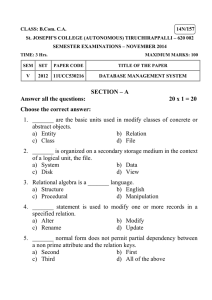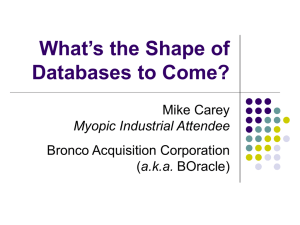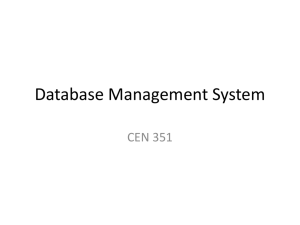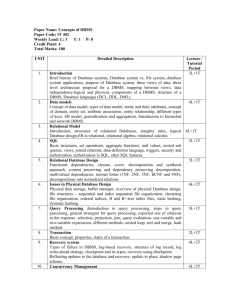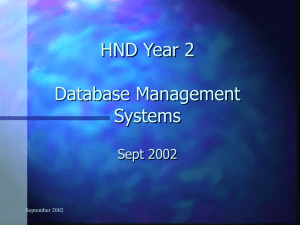ERE 596 D M
advertisement
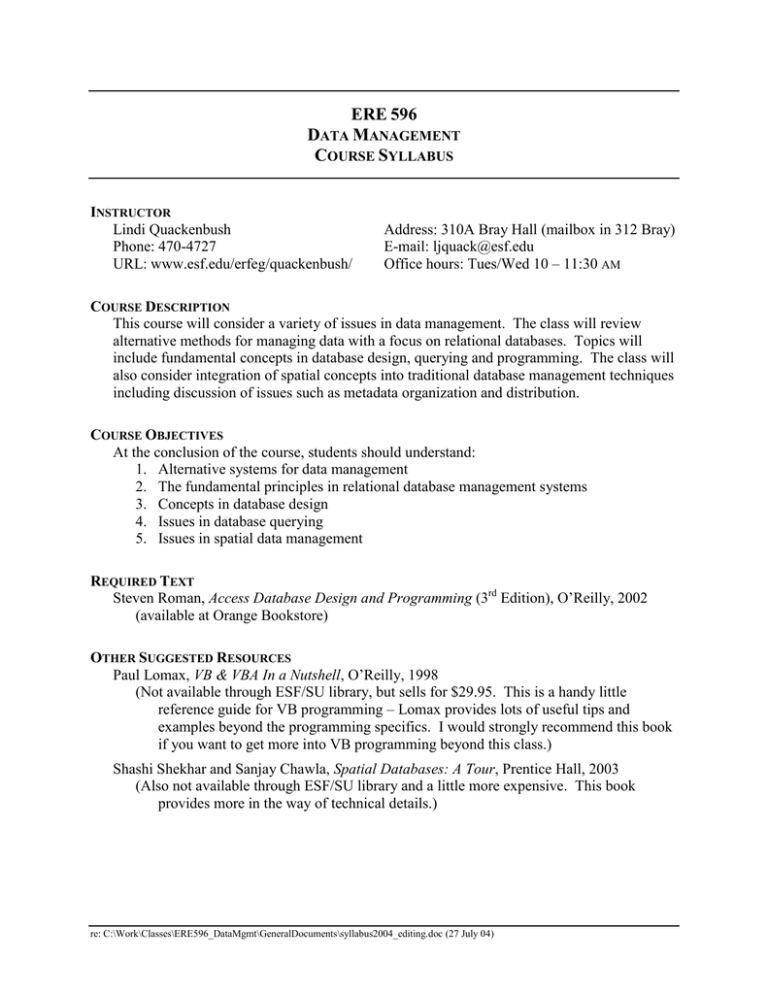
ERE 596 DATA MANAGEMENT COURSE SYLLABUS INSTRUCTOR Lindi Quackenbush Phone: 470-4727 URL: www.esf.edu/erfeg/quackenbush/ Address: 310A Bray Hall (mailbox in 312 Bray) E-mail: ljquack@esf.edu Office hours: Tues/Wed 10 – 11:30 AM COURSE DESCRIPTION This course will consider a variety of issues in data management. The class will review alternative methods for managing data with a focus on relational databases. Topics will include fundamental concepts in database design, querying and programming. The class will also consider integration of spatial concepts into traditional database management techniques including discussion of issues such as metadata organization and distribution. COURSE OBJECTIVES At the conclusion of the course, students should understand: 1. Alternative systems for data management 2. The fundamental principles in relational database management systems 3. Concepts in database design 4. Issues in database querying 5. Issues in spatial data management REQUIRED TEXT Steven Roman, Access Database Design and Programming (3rd Edition), O’Reilly, 2002 (available at Orange Bookstore) OTHER SUGGESTED RESOURCES Paul Lomax, VB & VBA In a Nutshell, O’Reilly, 1998 (Not available through ESF/SU library, but sells for $29.95. This is a handy little reference guide for VB programming – Lomax provides lots of useful tips and examples beyond the programming specifics. I would strongly recommend this book if you want to get more into VB programming beyond this class.) Shashi Shekhar and Sanjay Chawla, Spatial Databases: A Tour, Prentice Hall, 2003 (Also not available through ESF/SU library and a little more expensive. This book provides more in the way of technical details.) re: C:\Work\Classes\ERE596_DataMgmt\GeneralDocuments\syllabus2004_editing.doc (27 July 04) ERE 596 DATA MANAGEMENT COURSE SYLLABUS COURSE REQUIREMENTS Lecture: Two hours of lecture per week: Monday 5:10 – 6:05 PM; Wednesday 3 – 3:55 PM, Bray Hall Room 313. Laboratory: Two hours of laboratory per week: 4 PM – 6 PM Wednesday, Baker Lab Room 156 (starting 4 September). Grading: Individual project Laboratory exercises Mid-term examination Final examination Class participation 30 % 45 % 10 % 10 % 5% INDIVIDUAL PROJECT The individual project provides an opportunity for students to work with a dataset of their choosing to explore concepts in database design, querying and programming. The project assignment with further details will be distributed in class the week of 4 October, with the lab period on 20 October reserved for discussion. Submissions for the project will be in stages throughout the remainder of the semester. COMPUTER USAGE Word processing and spreadsheet software packages are considered basic tools in modern life. Lab exercises will often require submissions that use these fundamental packages. Email will be used as a common means of communicating outside class times. Students should provide Lindi Quackenbush with an e-mail address. Lab exercises will primarily be performed in the Mapping Science Laboratory. Students will be assigned server space but are responsible for independently backing up work. CLASS ABSENCE If you encounter a situation beyond your control in which you will be missing 3 or more days of classes, you can contact the Office of Student Life (110 Bray, 315-470-6660) and they will contact all your instructors for you. Supportive documentation may be required. ACCOMMODATIONS FOR STUDENTS WITH DISABILITIES If you have an identified disability and will need accommodations, you should contact Tom Slocum in the Office of Student Life in 110 Bray Hall. He will discuss the ESF process and work with you to access supportive services. If you have a learning disability, the College will require you to provide supportive documentation and will develop an approved accommodation sheet for you. Accommodations cannot be provided until the accommodation sheet is established and we meet to discuss its applicability to this course. Accommodations cannot be established retroactively. Page 2 of 3 ERE 596 DATA MANAGEMENT COURSE SYLLABUS PRELIMINARY LECTURE/LAB SCHEDULE DATE LECTURE TOPIC READINGS* 30 August General Introduction Chapter 1 31 August DBMS Chapter 2 6 September LAB TOPIC No lab No Lecture – Labor day 8 September DBMS and Relational DBMS Chapter 3 Introduction to Access 13 September Relational DBMS Introduction to Access II 15 September Relational DBMS and GIS 20 September Database design – Normalization Chapter 4 22 September Database design – Normalization cont. 27 September Querying – Relational algebra Normalization Chapter 5 29 September Querying – Joins Relational Algebra 4 October SQL Queries 11 October Querying – Query languages: SQL and Chapter 6 Access SQL Querying – SQL DML and DDL 13 October Spatial Querying SQL Queries II 6 October 18 October Mid-Term Examination Project discussion 20 October Guest lecture 25 October Visual Basic programming Chapter 7, (8), 9 27 October Programming in Access Chapters 10 – 13 GIS database development 1 November Programming in Access – DAO Chapters 14 – 16 3 November Programming in Access – DAO Introduction to VB 8 November Programming in Access – DAO 10 November Programming in Access – ADO Chapters 17-18 Introduction to VB II 15 November Programming in ArcGIS 17 November Indexing Project time 22 November Metadata 24 November No Lecture – Thanksgiving recess No Lab – Thanksgiving 29 November Data standards 1 December Data issues Project time 6 December Overview 8 December Final project presentations Project presentations *Readings refer to specified chapters in Roman text Page 3 of 3
